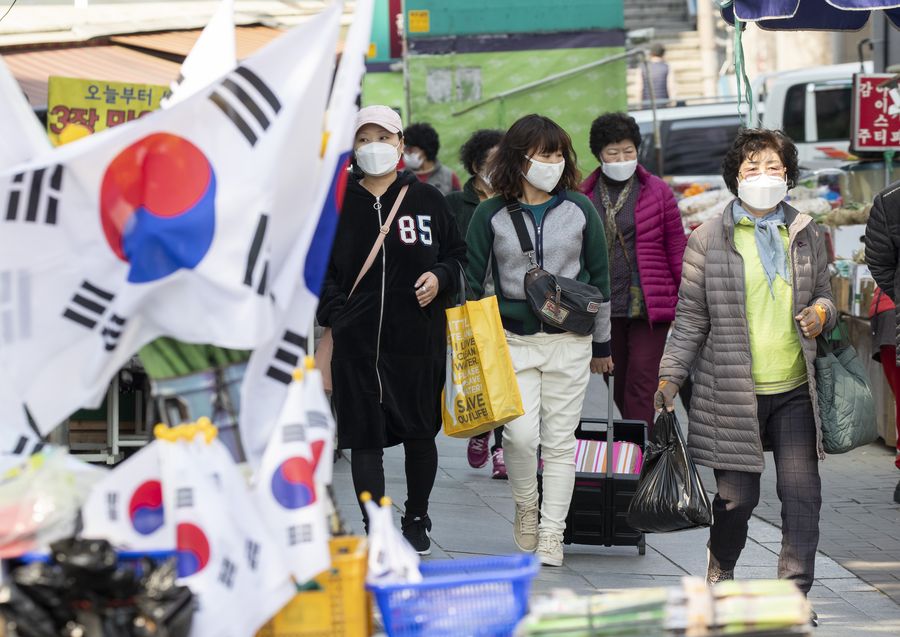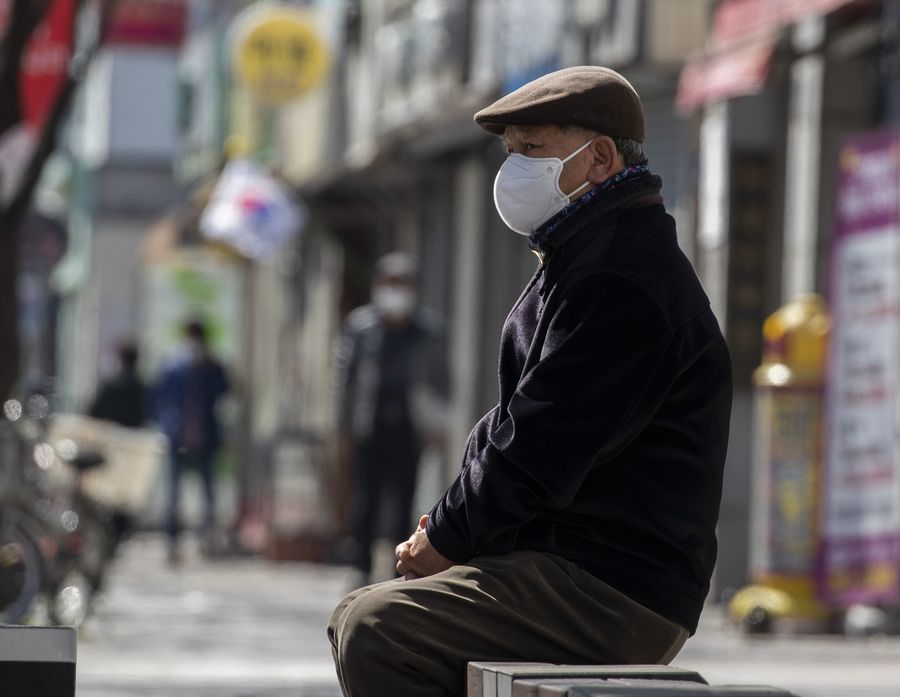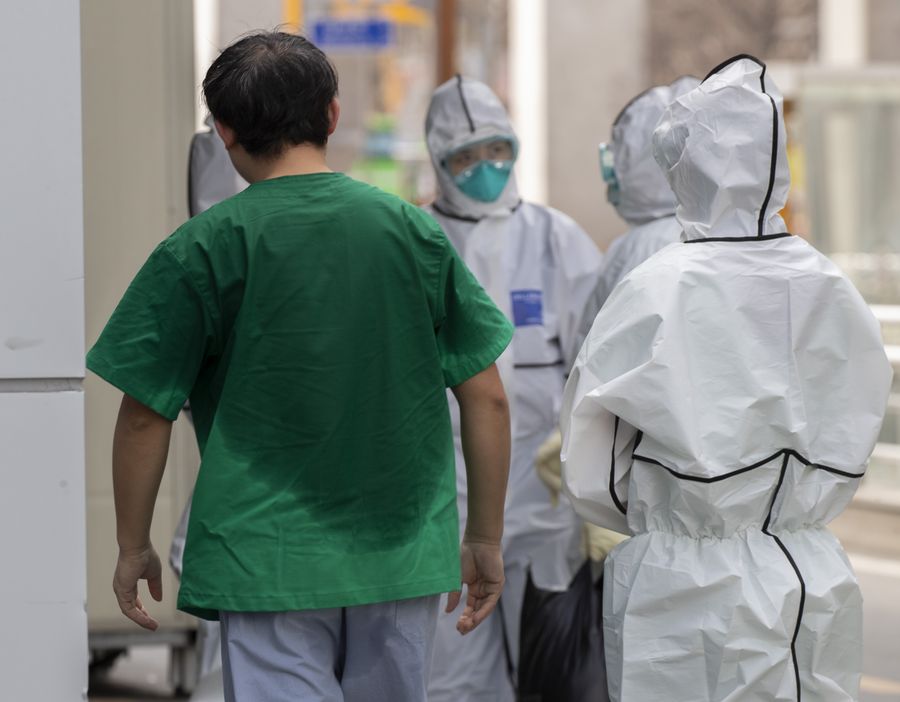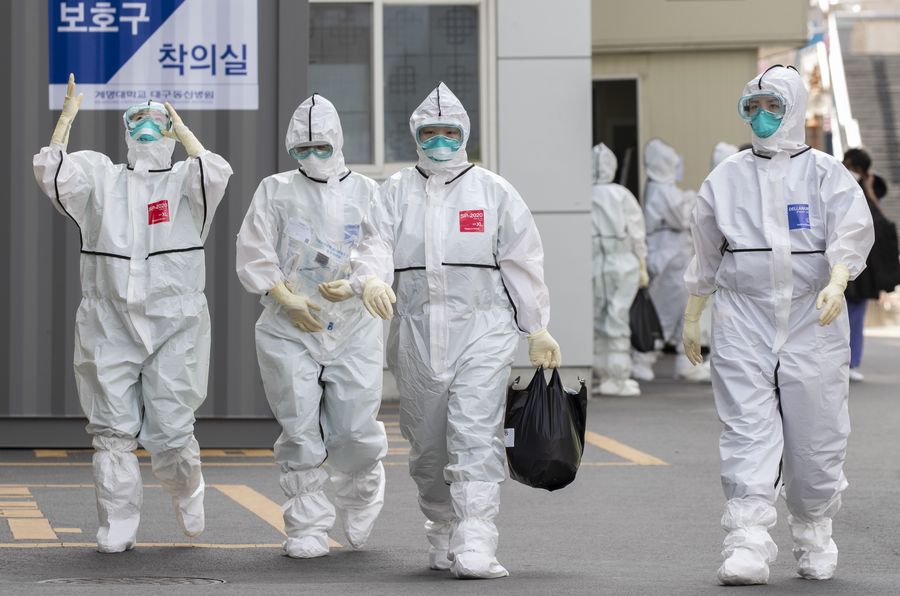
People walk on the street around the Seomun Market in Daegu, South Korea, March 17, 2020. (Photo by Lee Sang-ho/Xinhua)
Daegu, together with the entire South Korea, is struggling to return to normal life as the coronavirus outbreak slowed down for the past few days.
DAEGU, South Korea, March 18 (Xinhua) -- Half of the shops resumed business, while the other half remained closed Tuesday at Seomun Market, the biggest traditional market of Daegu city that has been the epicenter of the COVID-19 outbreak in South Korea.
Only a few customers were seen inside the shops. On the street, office workers dressed in suit walked along by twos and threes, with take-out coffee in their hands.
Despite the moderate recovery, it was a stark contrast with the cityscape of Daegu, about 300 km southeast of the capital Seoul, around two weeks earlier. The Seomun Market had been temporarily closed over the virus spread, the first shutdown since its opening hundreds of years ago.
Lots of bars, restaurants and shops had been closed, with almost all of concerts, sports and cultural events cancelled for the past weeks. People had refrained from traveling, shopping and social gatherings, while attending church services online.
From Monday, more cars and taxis were seen on the road of Daegu, said a taxi driver in his 70s who noted that it fell far short of a full recovery as he went back home with just a third of his daily revenue in normal times.

A man wearing mask rests on street in Daegu, South Korea, March 16, 2020. (Photo by Lee Sang-ho/Xinhua)
Daegu, together with the entire country, is struggling to return to normal life as the coronavirus outbreak slowed down for the past few days.
In the latest tally, South Korea has confirmed 8,320 COVID-19 cases in total. However, the daily new cases have stayed below 100 for the third consecutive day nationwide.
In Daegu, the confirmed cases totaled 6,098, but the daily new infections hovered below 100 for the sixth straight day after peaking at 741 on Feb. 29. Nearly 1,000 patients have been discharged from quarantine in the city after making full recovery.
"In an initial phase, we were in chaotic situations because of the lack of medical staff and supplies," said Kwon Tae-hyung, a doctor at the Keimyung University Daegu Dongsan Hospital that has been designated as the base hospital to treat infected patients in Daegu.
For the past weeks, volunteer doctors, nurses and other medical staff gathered in Daegu from across the country, helping improve situations of the city in a relatively short period of time, the doctor said.
"Many volunteers abandoned their main jobs and sacrificed themselves. If they adhered to their original businesses, the situations wouldn't have improved ... It's been made possible thanks to concerted efforts by all people with the heart of helping others," said Kwon.

Medical workers are seen at a hospital in Daegu, South Korea, March 15, 2020. (Photo by Lee Sang-ho/Xinhua)
The number of volunteer medical staff, including public health doctors and individual doctors and nurses, in Daegu was 954 as of Monday, according to Yonhap news agency. Scores of ambulances and ambulance workers as well as the policemen and the military medical staff volunteered to assist quarantine efforts in the city.
"Of course, I hope to return to normal life," said Kwon who has stayed away from his family for the past weeks for fear that he may transmit the virus to the family. "Many others here are the same as me," he added.
Kwon Seon-hee, a volunteer nurse at the Dongsan Hospital who came from Asian Medical Center in Seoul a week ago, told Xinhua that she realized the preciousness of normal life when watching patients admitted to the hospital.
"All patients are required to sit or lie down on beds alone around the clock. They stay alone, have difficulty sleeping (in a strange environment), and sometimes watch others fall into serious conditions ... It hurts my heart when keeping an eye on them," said the nurse.
She said the patients would have hoped to return to normalcy as she did, vowing to try her best to help the patients recover fully and recoup their normal life.

Medical workers walk at a hospital in Daegu, South Korea, March 15, 2020. (Photo by Lee Sang-ho/Xinhua)
Health authorities asked people to brace for a new normal as it anticipated a prolonged fight against the virus.
Jung Eun-kyeong, director of the Korea Centers for Disease Control and Prevention (KCDC), told a press briefing on Monday that in preparation for an expected "long-term war" against the virus, people would be required to accept a "new daily life."
Jung said the health authorities were reviewing new principles, suitable for the protracted fight against the COVID-19, urging vigilance among people as there remained a possibility for small clusters of infections in religious or other group facilities.
More than 130 people have been infected with the virus in Seoul in recent days due to the contagion that started from a call center. It was the biggest cluster of infections in the capital city.
In Gyeonggi province, surrounding Seoul, over 50 infections were reported in public worships of a Christian church.
To avoid cluster infections among students, the education ministry delayed the new school year by two more weeks to April 6.
The country expanded tighter immigration procedures to people from all countries around the world to help prevent the COVID-19 cases from being imported from abroad. ■



